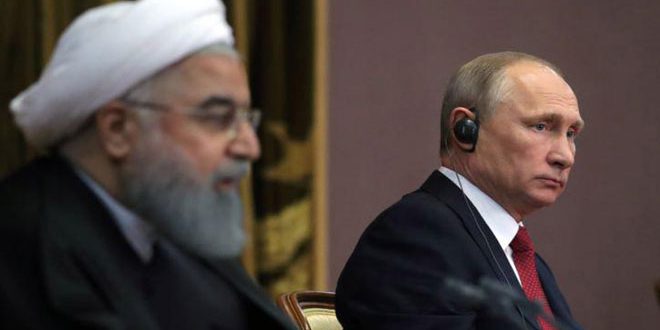The presidents of the guarantor countries of the cessation of hostilities in Syria (Russia, Iran and Turkey) stressed their support for Syria’s sovereignty and territorial integrity and continued anti-terrorism efforts.
The affirmation came in a joint statement following a trilateral meeting in Ankara on Wednesday which brought together Russian President Vladimir Putin, Iranian President Hassan Rouhani and Turkish President Recep Tayyip Erdogan.
The three countries, according to the statement, emphasized their strong and continued commitment to the sovereignty, independence, unity and territorial integrity of Syria, as they have reaffirmed their determination to continue active cooperation on Syria.
Separating terrorist groups from the armed opposition in Syria is crucial for the protection of civilians, said the joint statement, adding that Russia, Iran and Turkey intend to eliminate the terrorist organizations of the Islamic State (ISIS) and Al-Qaeda and the groups associated with them in Syria.
“There is no military solution to the crisis and in Syria and the only possible solution is through a political process, the statement said, adding that the Astana process has formed a successful formula to contribute to resolving the crisis.
The statement said that the guarantor countries expressed their conviction that the Syrian National Dialogue Congress, which was convened in Sochi on Jan. 30, 2018, constituted an important milestone in paving the way for the political process, reiterating their commitment to follow up on the results of the Congress, in particular the agreement to form a Constitutional Committee.
The statement underlined the necessity of creating suitable conditions for the return of Syrians displaced by terrorism to their country.
The guarantor states also welcomed United Nations Security Council Resolution 2401 issued last February to address the humanitarian situation in Syria, including in Raqqa, Al-Rukban Camp, Al-Fouaa, Kefraya and Idleb, stressing that they will continue cooperation to enforce the cessation of hostilities agreement in Syria.
The statement said that the guarantor states decided to hold a tripartite meeting in Iran at the invitation of Iranian president.
In a joint press conference following the meeting, Putin said that the tripartite talks touched upon all aspects of the political situation and the upcoming steps aimed at establishing stability and security in Syria.
He added that Russia, Iran and Turkey agreed on common points that were highlighted in the joint final statement, which confirms their keenness to contribute to enhancing Syria’s sovereignty, independence and territorial integrity, noting that this stance is principled, especially after the increasing attempts to divide Syria.
The terrorist organizations in Syria are trying to sabotage the process of national reconciliation, said Putin, adding that Moscow has obtained compelling evidences of preparing for a provocative operation and a chemical attack.
The Russian president said that thousands of civilians were evacuated from the Eastern Ghouta in cooperation with the Syrian government, in addition to exiting terrorists who declined to hand over their weapons.
He indicated that the process of delivering humanitarian aid continues, including assistance from Russian citizens, citing a cargo of 77 tons of Russian humanitarian aid delivered last February.
“We agreed to consolidate efforts for post-conflict reconstruction in Syria, primarily in the construction of social and infrastructure facilities,” Putin told reporters, noting that Russian companies are already actively involved in such work, and a number of projects are being implemented in areas that were recently under the control of terrorists.
This article was edited by The Syrian Observer. Responsibility for the information and views set out in this article lies entirely with the author.


